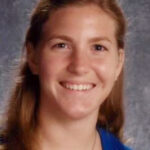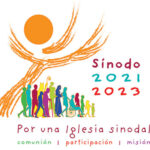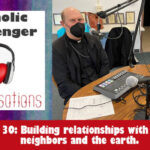
Bishop Thomas Zinkula, left, listens as Marist Brother Todd shares details about the border fence that separates Ciudad Juarez, Mexico, from El Paso, Texas. They were standing on the Mexican side of the border Nov. 5.
Bishop Thomas Zinkula accompanied five deacon candidates and their deacon formation director, Deacon Frank Agnoli, on a border immersion experience Nov. 3-6. The group participated in the Encuentro Project, a program that provides participants with new perspectives about forced migration and asylum seeking by vulnerable people. The program motivates participants to engage in peace, effective action for greater justice, and compassion for migrants and refugee persons as presented in Catholic Social Teaching.
Here are reflections from Bishop Zinkula about his experience:
I participated in the border immersion experience because the deacon formation class asked me if I would accompany them. I said “yes” because I have an insatiable curiosity about many things, but most especially about people. I enjoy experiencing people who are different from me in some way — people of different races, cultures and religions; people on the peripheries; people who live in other places. Most importantly, however, I tagged along so that our diocese can minister more fruitfully to the migrants and refugees in our midst. It is one thing to hear their stories, but it is quite another to see and be at one of the main crossing points from Mexico to the U.S., and to talk to and learn from people who are ministering to forcibly displaced persons at the border and to displaced persons themselves.
Once again, I learned that people are people. No matter how they speak or where they live or how they dress, people long for a safe place to live; access to good jobs, education and health care; adequate food and housing; and the freedom to follow their dreams. One learns these things by encountering others, listening to them, and walking with them. My participation in the Encuentro Project helped me see and understand more clearly that migrants and refugees are similar in many ways to my ancestors who came to the U.S. many years ago from Bohemia and Germany.
The Encuentro Project was an experience of solidarity for me. The things we did during our immersion experience allowed me to be in solidarity with the migrants and refugees at the border as well as with those who live with and minister to them. I felt that solidarity most profoundly during the celebration of the border Mass. At its heart, the Eucharist is the principal sacrament of unity and communion. I experienced communion with my brother bishops and the folks they serve on the border.
Our group did theological reflection each day; we looked at our daily experiences through the lens of our Catholic faith. We talked a lot about how we might apply back home what we learned in the border immersion experience. I like to use the see-judge-act method of analysis: seeing social situations, judging them in light of Catholic Social Teaching principles, and acting to promote justice and improve the situations of those in need.
I will continue to think and pray about the “act” part of this method. One thing that is clear to me already is that this experience will help me better understand and relate to the migrants and refugees to whom I minister, and it will aid my legislative advocacy on their behalf. Another thing that I have been thinking about and reflecting on is the need to provide opportunities for the people of the diocese to hear firsthand the stories of the migrants and refugees in our midst.











